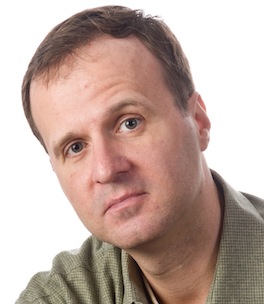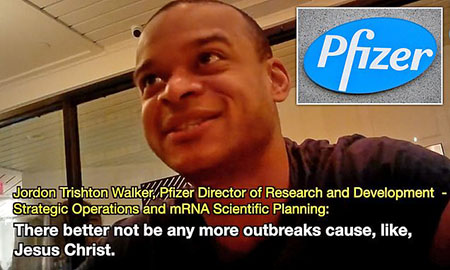Special to WorldTribune.com, February 20, 2023

Corporate WATCH
Commentary by Joe Schaeffer
Undercover journalist James O’Keefe of Project Veritas scored a major coup in late January when he released video of a Pfizer executive revealing that the company was exploring ways to “mutate” the COVID-19 virus in order to create new vaccines.
The video was posted onto YouTube, and promptly removed. Project Veritas was also given a “strike” against its account, making it unable to post any videos for a week:
BREAKING: @YouTube has just removed our @Pfizer story from the platform “due to a violation of our Community Guidelines”
Project Veritas channel has been given a “strike” and ability to upload ANY new videos is “restricted” for a week with threats of future “permanent removal” pic.twitter.com/YgrvceQc1w
— Project Veritas (@Project_Veritas) January 28, 2023
YouTube censored the organization again a few days later, removing a video detailing how the San Bruno, California Police Department had issued a criminal search warrant against one of its journalists for attempting to question YouTube Global Head of Trust & Safety Matt Halprin on a public street about why the video sharing goliath had blocked the PV Pfizer video.
BREAKING: @YouTube REMOVES Project Veritas video showing a criminal search warrant was issued against our journalist within MINUTES of it being posted. Claims we violated their "harassment and bullying" policy
When did journalism become "harassment & bullying?" pic.twitter.com/vuaofGNhgw
— Project Veritas (@Project_Veritas) February 8, 2023
It is readily apparent that YouTube, owned by Google, is out to protect Big Pharma from any uncomfortable queries on the subject of vaccines. “The only thing I [can] deduce from this is that this is YouTube throwing their weight around and throwing their influence around to a local police department that’s in their city where they’re headquartered, which is San Bruno,” Project Veritas reporter Christian Hartsock says of the warrant against him.
“You attempting to ask a question about this, resulting within five days of your phone records being accessed by a local police department. That is the speed of a terrorist investigation or a Homeland Security investigation where lives are at risk,” Project Veritas’s R.C. Maxwell noted.
The flagrant censorship and law-enforcement muscle flex should not come as a surprise, though, when one digs further into the Big Pharma hornet’s nest. Google and YouTube are not just performing services on behalf of a powerful industry. They are literally part of that industry, and they have highly placed friends in media, big business and the military industrial complex along for the ride.
 Mary Ellen Coe is Chief Business Officer at YouTube. Coe also sits on the Board of Directors for Merck, one of the largest vaccine producers in the world. Isn’t that nice?
Mary Ellen Coe is Chief Business Officer at YouTube. Coe also sits on the Board of Directors for Merck, one of the largest vaccine producers in the world. Isn’t that nice?
“Ms. Coe has a deep understanding of the digital landscape, as well as global strategy and operations, due to her experience as a senior leader at Google Inc.,” her bio at Merck reads.
YouTube’s grotesque multiple censorship of Project Veritas should provide all the red flags necessary to point out a dire conflict of interest at YouTube, but here’s the rub. The ruling elites don’t care about that anymore. Yes, the conflicts are blatant, but the network is airtight. It all points to an interconnected power grouping working seamlessly together in pursuit of a shared common agenda.
You may have heard that former Food and Drug Administration Commissioner Scott Gottlieb sits on the Board of Directors for Pfizer. This did not stop him from being a regular on big-box media’s overhyped coronavirus coverage for two-plus years.
An Oct. 2021 article on its website shows how CNBC played its little “we’re still an honest network, really” game. “Dr. Scott Gottlieb says Merck’s Covid pill ‘can make a real difference,’” the headline screams out.
A long article painting “the former FDA chief” as an authority on the issue follows. At the very end, tacked below the text of the article, comes the fine print:
Disclosure: Scott Gottlieb is a CNBC contributor and is a member of the boards of Pfizer, genetic testing start-up Tempus, health-care tech company Aetion Inc. and biotech company Illumina. He also serves as co-chair of Norwegian Cruise Line Holdings’ and Royal Caribbean’s “Healthy Sail Panel.”
Gottlieb’s Pfizer ties did in fact become somewhat common knowledge due to his omnipresent appearances on the major television networks and in the dominant press throughout the pandemic.
But did you also know that James C. Smith, “Chairman of the Thomson Reuters Foundation, a London-based charity supported by Thomson Reuters,” is also a member of Pfizer’s board?
Other interesting names to be found include Coca-Cola CEO James Quincey and Suzanne Nora Johnson, a retired vice chairman at Goldman Sachs who is also on the Board of Trustees at influential D.C. think tank The Brookings Institution.
Joining YouTube exec Coe on the Board of Directors at Merck is Kathy J. Warden, CEO of military contracting behemoth Northrop Grumman.
Big War Inc. is also on board at vaccine giant Johnson & Johnson in the person of Marillyn A. Hewson, former Executive Chairman of Lockheed Martin. Hewson’s J&J bio notes that she is also a member of the Trilateral Commission and the Council on Foreign Relations.
Still think it’s all just a conspiracy?
The ties go even deeper. Just before the coronavirus pandemic exploded on an unsuspecting world, Google had gone into the vaccine development industry for itself. Maryam Henein, writing at Epoch Times in 2019, pointed out that:
GV, the venture capital arm of Google’s parent company, Alphabet, has also invested in Vaccitech – a company described as “the future of mass vaccine production.”
Founded by scientists at Oxford University, Vaccitech’s end goal is to develop a vaccine that would be the first in the world to fight all types of flu.
And then there is this:
“Google sister-company Verily is teaming with big pharma on clinical trials,” reads the headline to a May 21, 2019 report by CNBC.
From the article:
Verily, the health and life sciences company under Google parent-company Alphabet, is moving into the clinical trials space.
The company announced Tuesday strategic alliances with the pharmaceutical companies Novartis, Sanofi, Otsuka and Pfizer to help it move more deeply into the medical studies market. The goals for Verily, and its pharma partners, are to reach patients in new ways, make it easier to enroll and participate in trials, and aggregate data across a variety of sources, including the electronic medical record or health-tracking wearable devices.
Big Pharma was excited by the potential of one particular facet of its development partnership with Google:
“We see Verily’s technology as a way for us to reach patients and get them interested,” said Badhri Srinivasan, head of global development operations at Novartis. In an interview, Srinivasan shared an example of engaging people who are already searching on Google for relief from asthma symptoms. At that point, Verily could surface an ad to suggest they enroll in its clinical trial patient registry, dubbed Baseline, and sign up for relevant asthma-related clinical trials if they chose to do so.
There you have it. Big Pharma, right before the COVID crisis kicked off, was salivating over the prospect of Google serving as its information network. We all know how that turned out.
Verily, an Alphabet company, lists Big Pharma powerhouses GSK and Johnson & Johnson as official “collaborators.” It is also highly noteworthy that the University of Pittsburgh, which has conducted horrific government-sponsored experiments on aborted babies, is also a medical collaborator of Verily.
If more Americans aren’t aware of the grisly goings-on at Pitt, which include “scalping 5-month-old aborted babies to stitch onto the backs of lab rats,” perhaps that may be in large part because Google has an ongoing business relationship with the school.
In short, YouTube and its parent company Google aren’t censoring the truth on vaccines on behalf of Big Pharma. They are doing so because they are an active part of Big Pharma themselves.
Action . . . . Intelligence . . . . Publish
